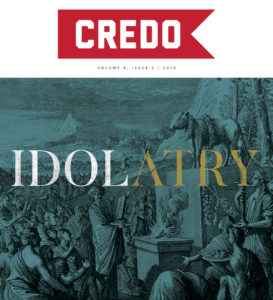 Must all classics of systematic theology be long? One thinks of John Calvin’s Institutes which spanned some 80 chapters in its final edition published in 1559. Herman Bavinck’s Reformed Dogmatics is in four massive volumes.
Must all classics of systematic theology be long? One thinks of John Calvin’s Institutes which spanned some 80 chapters in its final edition published in 1559. Herman Bavinck’s Reformed Dogmatics is in four massive volumes.
Must all classics of systematic theology be dense? Passages in the works of Francis Turretin, for example, can sometimes take a third, sometimes even a fourth look to comprehend.
And must all classics of systematic theology, particularly Reformed theology, be written by white men? Simply read the list of the most popular Reformed systematic texts – Bavinck, Berkhof, Boyce, Grudem, Frame, et al. – and you might be tempted to answer “yes.”
Charles Octavius Boothe wrote his systematic theology, Plain Theology for Plain People, in 1890. Boothe’s relatively unknown work has recently been republished by Lexham Press. This new edition of Boothe’s book includes an excellent introduction by Dr. Walter R. Strickland II, who lobbied for its republication. A slave from birth in mid-19th century Alabama, Boothe was freed from his master by the Emancipation Proclamation of 1865 and freed from his sin by God in the same year. Boothe went on to be the pastor of the First Colored Baptist Church of Meridian, Mississippi and later the pastor of Dexter Avenue Baptist Church in Montgomery, Alabama, now known as King Memorial Baptist Church, named after its most famous pastor, Martin Luther King Jr.
Plain Theology For Plain People was written for one simple reason: to bring theology down to a level where the average sharecropper could understand. Now, do not read “plain” as “watered-down.” The vernacular may be plain, but the content is robust. Generations of black Americans were denied access to the kind of education that would allow them to ingest the tomes of Augustine or Calvin, John Owen or Lemuel Haynes. And so Boothe wrote a “plain theology” for “plain people” that brought the depths of God’s Word to the everyman.
So why pay attention to a short, basic theology written by an ex-slave over 100 years ago? What follows are five reasons to read Plain Theology for Plain People for the edification of your own soul and the benefit of your local church.
1. Plain Theology is concise and focused
Plain Theology’s limited scope allowed the book to focus on the main points of theology. Boothe did not set out to chase down every rabbit hole and so what he produced is a volume distilled down to theology’s most important topics. For that reason, I believe that Plain Theology for Plain People is a wonderful book to read with other Christians in your local church, particularly new believers.
2. Plain Theology is orthodox, evangelical, and reformed
The real strength of any good book of theology is its content. Boothe stood firmly in the theological tradition of the Nicene Creed, the Five Solas of the Reformation, and the New Hampshire Baptist Confession of Faith. The spirituality of Plain Theology’s author is driven by a God-centered vision of salvation flowing from the eternal decrees of God and accomplished by his sovereign grace in Christ.
Boothe was committed to an orthodox, classical theism. He stands as a messenger from our theological forefathers, imploring us to hold the line on issues that have begun to unravel in evangelicalism. He affirms the immutability of God, writing “Change belongs to man, not to God, who is perfect” (19). Boothe touches briefly on the doctrine of divine simplicity. He wrote: “God is one essence, one character, one mind; not many essences, not many minds. These different attributes are not different gods, but different qualities of the same God, and exist in and are of the same essence” (20).
Boothe’s theology was thoroughly evangelical as well. Plain Theology includes an explanation of the doctrine of penal substitutionary atonement. After spending pages setting the atonement in its canonical context, Boothe concludes simply, “Thus Jesus Christ became our substitute. The innocent Lamb of God, as a sacrifice for sin, must come beneath the sword of justice, bearing our sins in his own body on the tree.” Then, having discussed Christ’s passive obedience, Boothe says the ground of our justification before God is “found in the work, the whole of the work, of the Son of God” (70). Any reader of Plain Theology will walk away with a greater appreciation for the glories of the gospel.
The priority and effectiveness of God’s grace were central in Boothe’s soteriology. Concerning election, he writes, “By election we understand God’s choice of individuals of the sinful race of man to become possessors of eternal life through Jesus Christ our Lord” (61). With regards to the doctrine of regeneration Boothe says frankly, “Many a sinner who has thought he could work out a salvation for himself has found all his hope of helping himself vanish when confronted with the words of the Lord: “Ye must be born again” (64).
3. Plain Theology is a Baptist book
I wouldn’t expect my Presbyterian or Anglican brothers to appreciate Charles Boothe’s ecclesiological conclusions. What I do hope is that non-Baptists and Baptists alike would be encouraged by is Boothe’s conviction that we have a sufficient guide for how to order God’s church in the Word of God. In an age of pragmatism, implicit and explicit, Boothe’s voice is a breath of fresh air.
Steps 1 and 2 of Christian obedience, according to Boothe, are baptism and church membership. (76-78). Boothe holds the traditional Baptist position of closed membership, stating in his characteristically irenic tone that those who have not been baptized, even those who believe themselves to be (i.e. paedobaptists), may not become members of the church.
What is really unique about Boothe’s ecclesiology is that it is couched in a chapter of the book entitled “How Christians Should Live and Labor.” To Boothe, the church stands at the center of the Christian life. Church life is about putting on Christ and living to God’s glory together in covenant membership. Boothe’s doctrine of the church includes both the skeleton of the church structure (membership, discipline, ordinances) and the organs of church life (love, fellowship, and unity). We would do well to sit at the feet of our elder Baptist brother and learn about God’s plan to bring himself glory through local churches.
4. Plain Theology was written by a black man
If you haven’t picked up on it by this time, Charles Octavius Boothe was a black man. And his ethnicity is one reason that white evangelicals should read his book. But it is key, especially for us who are in the ethnic majority, to have the voices of those who don’t share our cultural assumptions in our ears. As I’ll explain in the point below, Boothe saw the implications of his theology better than many white theologians of his day. We are all products of our culture, complete with implicit biases and blind spots. Reading minority authors, as well as having flesh and blood friendships with minority Christians in our churches, will help us to walk circumspectly.
Boothe’s Plain Theology corrects the mistaken assumption that to be a reformed evangelical is to be Anglo. Boothe’s Plain Theology corrects the mistaken assumption that to be a reformed evangelical is to be Anglo. Click To TweetEven if you know such a notion is mistaken, propagating materials from minority voices will help others to understand that too.
5. Plain Theology is a work of applied theology
Consider Charles Octavius Booth in his context. He must have met scores of fellow believers, people who exulted in the same gospel truths that he did, who considered him a spiritual equal but inherently inferior in the public square. Some of his greatest theological influencers were probably men like James P. Boyce, the famous systematician and co-founder of The Southern Baptist Theological Seminary, who set forth a body of divinity affirming the plight of man in Adam and the reconciliation won through the person and work of Christ while at the same time supporting systems that oppressed black men and women created in the image of God.
Yet Boothe, by the grace of God, believed the orthodox theology of his oppressors and then applied it better than said oppressors in order to bind the wounds of those long oppressed. When he wrote, “One cannot increase in his love to God while there is a decrease in his love to his neighbor nor increase in his love to neighbor while his love to God is decreasing.” (95) Boothe expressed his deep affection for others that his own love of God produced – a love for others painfully absent from the lives of so many theologians in his day. Plain Theology reminds the reader to let the Word of God have its full effect on every area of life.
Boothe’s classic work of theology, Plain Theology for Plain People, combines everything that is right about the theological project. Theology and doxology, faith and practice, meet here in this book.


